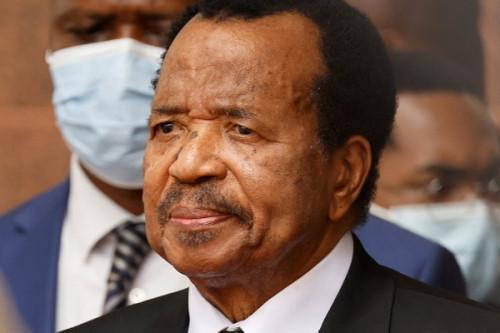
Industrial gas: Minister Atangana refers GDC’s price hiking decision to President Paul Biya

(Business in Cameroon) - Given gas supplier Gaz du Cameroun’s (GDC) determination to apply a 20% hike on its industrial gas price despite the government’s order, Minister of Trade Luc Magloire Mbarga Atangana will request President Paul Biya’s (Photo) arbitration on the matter.
The government official disclosed the information in a letter sent, on August 29, to the CEO of Gaz du Cameroun. "(...) I would also like to point out that this matter has been referred for the decision of the high command and that nothing can be done outside this scope without deliberately violating the relevant texts and rules,” Minister Mbarga Atangana wrote.
In the editorial terminology of government officials in Cameroon, “high command” usually refers to the President of the Republic. To corroborate this thesis, Minister Mbarga Atangana's letter was first sent to the Minister of State, Secretary General of the Presidency of the Republic, Ferdinand Ngoh Ngoh.
However, in addition to requesting arbitration from the Head of State, Luc Magloire Mbarga Atangana's letter to the CEO of GDC once again reiterates his opposition to the unilateral increase in the price of industrial gas supplied by Gaz du Cameroun to some thirty industrial companies in Douala. "I was informed of your supply suspension notice, effective September 1, 2023, for industrial natural gas consumers should they fail to pay the supplementary invoices issued by you, raising your prices by 20%. In this respect, I have the honor of reminding you of my letters (...) of May 30 and June 14, 2023, inviting you to fully comply with enforceable texts and consequently asking you to postpone any unilateral and uncoordinated measures to increase prices,” the government official added.
Prior price approval
Since the letter of May 15, 2023, in which GDC announced a 20% increase in its tariffs, effective June 1, 2023, the Minister of Trade has been accusing GDC of non-compliance with enforceable regulations concerning industrial gas prices in the domestic market. To support that argument, the government official initially invoked the provisions of Decree no. 2023/232 of May 4, 2023, laying the implementing guidelines of Law no. 2019/008 of April 25, 2019, on the Petroleum Code.
The decree effectively subjects an increase in the price of natural gas distributed in the domestic market to a prior approval process. That process requires economic operators wishing to increase the price of their goods to first submit the decision to the government along with all the documentation supporting their proposed decision. Depending on the circumstances, the government may simply reject the decision, approve it, or decide on a “fairer” price increase.
During a consultation meeting held on July 13, 2023, in Yaoundé, the gas company's executives disputed the argument informing that the company was not subject to the provisions of the 2019 Petroleum Code and its 2023 implementing decree. They said they were instead bound by the provisions of the investment agreement signed in 2009 with the Republic of Cameroon.
To counter that claim, Minister Mbarga Atangana pointed at a provision of the said investment agreement between GDC and the Republic of Cameroon. That provision requires the company to negotiate any pricing decision with the government, through the National Hydrocarbons Corporation (SNH) and the Ministry of Mines, before implementing it in the domestic market.
Soaring energy costs
Based on that Provision, Minister Mbarga Atangana suspended GDC's pricing decision. The government official also invited its executives to either comply with the pricing provisions of the 2019 Petroleum Code or the 2009 investment agreement signed with the government.
However, GDC, which holds a monopoly on the processing and supply of natural gas –used by industrial companies as a backup energy source amid repeated power outages in the country, seems determined not to comply with any of the Cameroon government's prescriptions. It even threatened to cut supply to its clients that are opposed to its new pricing as of September 1, 2023, at 8 a.m.
Pending the final decision requested from the President of the Republic, in a letter dated August 28 addressed to the Minister of Trade, the Cameroon Organization of Steel Processing Industries (Ocita), whose members are the main consumers of industrial gas, warns: "our industries cannot withstand another energy blow, with a 20% increase in industrial gas, after electricity (30% increase) and the extension of the Special Tax on Petroleum Products (Tspp)" to industrial gas.
Brice R. Mbodiam
Mags frontpage
- Most read 7 days
- shared 1 month
- read 1 month































